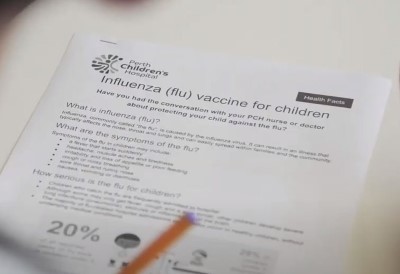Search
Research
An audit of the reliability of influenza vaccination and medical information extracted from eHealth records in general practiceTo evaluate the reliability of information in GP electronic health records (EHRs) regarding the presence of specific medical conditions and recent influenza vaccination
Research
Randomized controlled trial of text message reminders for increasing influenza vaccinationWe conducted a randomized controlled trial of short message service (SMS) reminders for influenza vaccination.
Research
Epidemiology of seasonal influenza infection in pregnant women and its impact on birth outcomesResults from this linked population study suggests that there are differences in maternal infection by virus type and support the provision of seasonal vaccines

News & Events
RSV and influenza detections hit record low levels in 2020Western Australia has experienced historically low levels of respiratory syncytial virus (RSV) and influenza this winter due to the public health measures implemented to prevent the spread of COVID-19.

News & Events
Help us build a new weapon in the fight against deadly fluAt just two years old, Lucy lost her fight against flu. With your generous help, we can finally beat influenza.

News & Events
Australian parents oblivious to true danger of the fluNew research investigating the devastating impact of the 2017 flu season by PAEDS-FluCAN, a national collaboration observing influenza in children, confirmed it was time to take action after thousands of children were hospitalised with the virus last year.
News & Events
Time running out to prepare for flu seasonPeople are being urged to ensure they've had their vaccination with the 'flu season expected to hit in Western Australia within weeks.
Research
Neonatal and infant mortality after maternal influenza and pertussis vaccination: Probabilistically linked cohort studyMaternal influenza and pertussis vaccination is an important strategy to reduce morbidity and mortality in infants. Previous vaccine safety studies have mostly focused on the association between maternal vaccination and fetal death.
Research
Boosting the influenza vaccine schedule in children with cancer: a prospective open-label studyCurrent immunization guidelines recommend one dose of influenza vaccine for children aged ≥9 years and two doses for younger or vaccine-naïve children. However, children receiving chemotherapy have an attenuated immune response. We performed a prospective open-label study in children undergoing treatment for cancer at Perth Children's Hospital, Western Australia, to examine the safety and efficacy of a boosted influenza schedule.
Research
Spatiotemporal patterns of influenza in Western AustraliaUnderstanding the geospatial distribution of influenza infection and the risk factors associated with infection clustering can inform targeted preventive interventions. We conducted a geospatial analysis to investigate the spatial patterns and identify drivers of medically attended influenza infection across all age groups in Western Australia.
